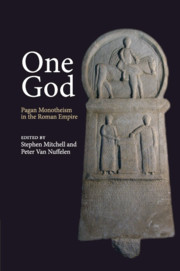Book contents
- Frontmatter
- Contents
- Preface and acknowledgements
- List of abbreviations
- 1 Introduction: the debate about pagan monotheism
- 2 Pagan monotheism as a religious phenomenon
- 3 Pagan ritual and monotheism
- 4 The case for pagan monotheism in Greek and Graeco-Roman antiquity
- 5 Monotheism between cult and politics: the themes of the ancient debate between pagan and Christian monotheism
- 6 The price of monotheism: some new observations on a current debate about late antiquity
- 7 Megatheism: the search for the almighty god and the competition of cults
- 8 Deus deum … summorum maximus (Apuleius): ritual expressions of distinction in the divine world in the imperial period
- 9 Further thoughts on the cult of Theos Hypsistos
- Bibliography
- General index
- Index of authors, works and citations
4 - The case for pagan monotheism in Greek and Graeco-Roman antiquity
Published online by Cambridge University Press: 20 May 2010
- Frontmatter
- Contents
- Preface and acknowledgements
- List of abbreviations
- 1 Introduction: the debate about pagan monotheism
- 2 Pagan monotheism as a religious phenomenon
- 3 Pagan ritual and monotheism
- 4 The case for pagan monotheism in Greek and Graeco-Roman antiquity
- 5 Monotheism between cult and politics: the themes of the ancient debate between pagan and Christian monotheism
- 6 The price of monotheism: some new observations on a current debate about late antiquity
- 7 Megatheism: the search for the almighty god and the competition of cults
- 8 Deus deum … summorum maximus (Apuleius): ritual expressions of distinction in the divine world in the imperial period
- 9 Further thoughts on the cult of Theos Hypsistos
- Bibliography
- General index
- Index of authors, works and citations
Summary
DEFINING MONOTHEISM
A fact of crucial importance for the history which many of us share is that in late antiquity a large part of the population of the Roman Empire, perhaps even the majority, but in any case the dominant part of the population, converted to Christianity, and Christianity became the official religion of the Empire. Part of becoming a Christian, put in modern terms, is to become a monotheist, that is, roughly speaking, a person who believes in just one god, namely in God with a capital ‘G’, unless, of course, one already was a monotheist. But at least the vast majority of the inhabitants of the Roman Empire had been, again in modern terms, polytheists, that is, again roughly speaking, persons who believe in a plurality of gods. Given the importance of the fact that Christianity within the relatively short time of a few centuries came to be the dominant religion within the Empire, replacing, and for the most part eliminating, the various forms of paganism, one would like to know how this came about. Obviously there are answers to this from a religious perspective. But, since we are dealing with a remarkable historical phenomenon, we might want to understand how this came about in purely historical terms. From this perspective the change is bound to present itself as a highly complex matter.
- Type
- Chapter
- Information
- One GodPagan Monotheism in the Roman Empire, pp. 53 - 81Publisher: Cambridge University PressPrint publication year: 2010
- 1
- Cited by



